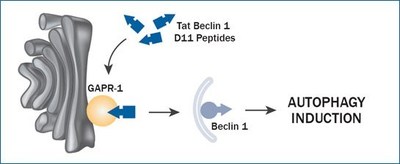Bio-Techne Leads the Way in Scientific Support for Autophagy Research
MINNEAPOLIS, April 26, 2018 /PRNewswire/ -- Bio-Techne, a family of brands providing a unique portfolio of products and services for basic and clinical research, has a leading role supporting autophagy research.
Autophagy (or "self-eating") is an important basic cellular process by which cell components are degraded by lysosomes or vacuoles and recycled. Autophagy plays a crucial role in human health and disease. Disrupted autophagy has been implicated in Parkinson's disease, type 2 diabetes, cancer, and is now a major target for drug discovery and development.
Autophagy has been known for over 50 years but its fundamental importance in physiology and medicine was only recognized after Yoshinori Ohsumi's paradigm-shifting research in the 1990's. For his discoveries, Yoshinori Ohsumi was awarded the 2016 Nobel Prize in Physiology or Medicine.
Proud Supporter of International and National Autophagy Conferences
Bio-Techne is deeply committed to supporting autophagy research and forums that allow for the presentation of innovative research and the exchange of ideas focused on new developments in the field of autophagy. In addition to Bio-Techne's support at this year's Gordon Research Conference: Autophagy in Stress, Development and Disease, other sponsored autophagy meetings from Q1 of FY2018 include:
- Keystone Symposia - Selective Autophagy, Kyoto, Japan
- EMBO Conference - Autophagy: From Molecular Principles to Human Diseases, Dubrovnik, Croatia
- Autophagy UK - 4th UK Autophagy Network Meeting, Cambridge, UK
- CFATG - 7th Autophagy Scientific Days, Paris, France
Bio-Techne's Autophagy Inducing Peptide Poster Accepted for Presentation at 2018 Gordon Research Conference
Bio-Techne showcased the improved potency of Tat-D11 over Tat-Beclin1 peptides for the induction of autophagy at this year's Gordon Research Seminar: Autophagy in Stress, Development and Disease in Lucca, Italy.

Figure 1. GAPR-1/GLIPR2 is a negative regulator of autophagy and binds Beclin1 to inhibit autophagy. In the presence of Tat-Beclin1 D11 (Tat-D11) peptides, Beclin1 bound to GAPR-1 is released, allowing Beclin1 to mediate autophagosome formation and autophagy induction. The Tat-D11 peptide is shorter and has greater potency compared to the original Tat-Beclin1 peptide, inducing the formation of over fivefold more autophagosomes and autolysosomes.
Excellence in Products and Resources for Autophagy Research
Bio-Techne's commitment to providing high quality reagents for autophagy research has been recently recognized by CiteAb, which identified the key autophagy detection reagent, anti- LC3B antibody (NB100-2220) as the most cited antibody in the market for monitoring autophagy.
Additionally, Bio-Techne's autophagy content activities including handbooks, white papers, webinars, and Investigator's interviews successfully maintain a line of communication with researchers, highlighting their contributions and keeping Bio-Techne informed on the most recent scientific progress as well as investigators needs.
About Bio-Techne Corporation (NASDAQ: TECH)
Contact: Dave Eansor, Senior Vice President, Biotech Division, 612-379-2956

![]() View original content with multimedia:http://www.prnewswire.com/news-releases/bio-techne-leads-the-way-in-scientific-support-for-autophagy-research-300637432.html
View original content with multimedia:http://www.prnewswire.com/news-releases/bio-techne-leads-the-way-in-scientific-support-for-autophagy-research-300637432.html
SOURCE Bio-Techne Corporation
Released April 26, 2018